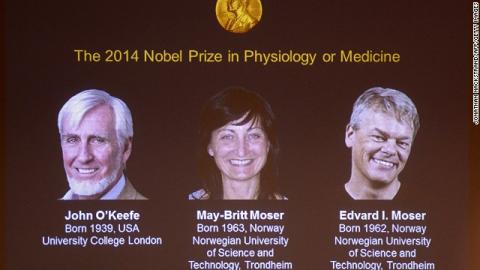Nobel prize for medicine goes to discoverers of brain's 'inner GPS'
According to the committee, the Mosers, the fifth couple in history to share a Nobel Prize, picked up O'Keefe's work in 2005. "They identified another type of nerve cell, which they called 'grid cells' that generate a coordinate system and allow for precise positioning and pathfinding," according to the committee. "Their subsequent research showed how place and grid cells make it possible to determine position and to navigate."
According to the committee, their discovery is groundbreaking because it "solved a problem that has occupied philosophers and scientists for centuries – how does the brain create a map of the space surrounding us and how can we navigate our way through a complex environment?" The committee will announce the winner of the physics prize on Tuesday, the chemistry prize winner on Wednesday and the peace laureate on Friday. The economics prize winner will be announced next week, while the committee has yet to set a date for the literature prize winner.
The annual award ceremony is set for December 10 – the anniversary of Alfred Nobel's death – in Stockholm.
Thomson Reuters, which has accurately forecasted 35 Nobel Prize winners since its inception in 2002, announced its 2014 "Nobel-class" Citation Laureates last month. Its short list included David Julius, "for elucidating the molecular workings of how our nerves process the sensation of pain, opening the way to new advances in pain management" and two professors from New York's Rockefeller University for physiology or medicine: James E. Darnell, Jr., an emeritus professor of the Laboratory of Molecular Cell Biology, and Robert G. Roeder, a professor at the Laboratory of Biochemistry and Molecular Biology.
Last year, Israeli-born Arieh Warshel and South African-Israeli Michael Levitt shared a Nobel Prize for chemistry, becoming the 11th and 12th Israelis to garner that honor.
Ido Efrati

